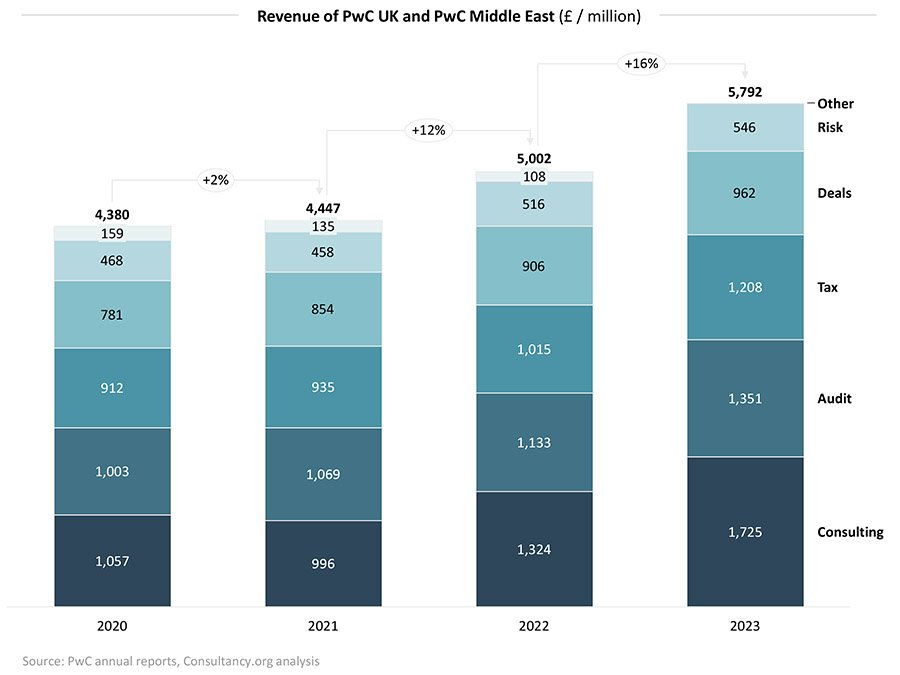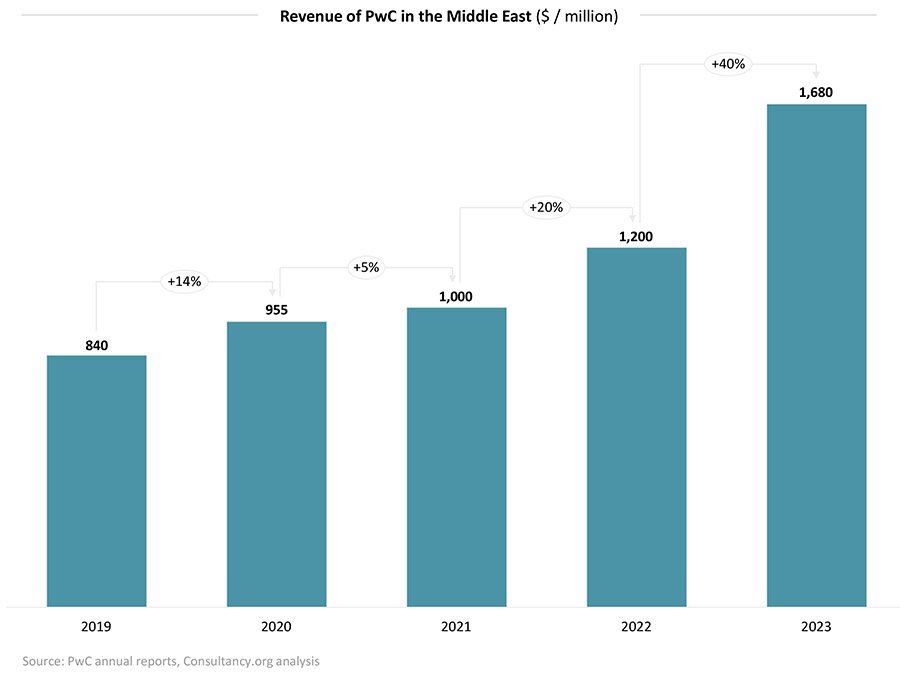Big Four firm PwC has lifted its revenues by 10% in local currency terms to a record $53 billion, with the Middle East and India businesses receiving global praise for their star performance.
In its 2022/23 financial year, which ended on 30 June 2023), PwC enjoyed growth across all its lines of business – Assurance, Advisory, and Tax & Legal – and all its main reporting geographies – the Americas, Europe, Middle East and Africa, and Asia Pacific.
In constant US dollar terms, growth was up 6% to $53.1 billion, up from $50.3 billion the year previous.

The largest jump in revenues was booked in the Americas division, which saw revenues grow by 10.7%, with PwC’s largest market the US recording growth of 11.2%. Notably, the Brazil member firm achieved growth of 14%, the strongest revenue growth across the South and Central America region.
In the Europe, Middle East and Africa division, growth was headlined by the UK member firm, which enjoyed a 16% spike in turnover. The German arm saw turnover rise by 13%, while Australia also enjoyed double-digit growth.
Aside PwC’s formal reporting, it was however the Middle East practice that was crowned the network’s king (or queen) of growth. In 2021, PwC stopped reporting its revenues specifically for the Middle East, consolidating the results in the UK member firm, which hit £5.8 billion in financial year 2023.
Reporting by Financial Times suggests that the Middle East grew its business by about 40% to nearly £1.5 billion, dwarfing the near 10% growth of the UK operation. Headcount grew by over 20% to 8,000 staff working from offices in 12 countries – in Bahrain, Egypt, Iraq, Jordan, Kuwait, Lebanon, Libya, Oman, the Palestinian territories, Qatar, Saudi Arabia and the United Arab Emirates.

Kevin Ellis, chair and senior partner of the UK and Middle East firm, attributed the rapid growth in the Middle East to investments triggered by national transformation agendas.
“Saudi Arabia is the biggest driver in the Middle East, although the other parts of the Middle East are good too,” he said. “The region is seeing huge transformation and economic diversification from oil. They’re spending a lot of money on it and moving faster with their ESG transformation.”
Ellis also shined the light on the Middle East consulting practice, which is delivered by PwC Consulting and Strategy&, the firm’s strategic consulting subsidiary (formerly Booz & Company).
“Our consulting revenue grew by 30% in FY23. This was driven by demand in the Middle East, as clients invest in programmes to modernise and diversify the region’s economy beyond oil. Energy diversification and sustainability are also behind many transformation projects, as the climate crisis and new reporting requirements galvanise businesses to move towards net zero.”

Meanwhile, PwC’s second star performer was the Indian practice, with which the Middle East nurtures close ties. In India, revenue soared by 24%, and headcount grew to over 50,000 staff across the domestic India practice and the global delivery centres based in the country.
“India [realised] a very strong performance, with a revenue increase of 24% it was one of the fastest growing large firms in the PwC network,” said Bob Moritz, the New York-based Global Chair of PwC.
PwC: a consulting firm
With revenues of $22.6 billion, Advisory remained PwC’s largest area of business, extending its lead over Assurance ($18.7 billion) on the back of a faster growth rate. The Tax & Legal line of business brought in $11.8 billion.
Talking about the Advisory business, Moritz said: “Much of the growth in our Advisory business has been driven by our clients’ focus on the need to digitally transform their business models. We’ve also met the demand of our clients to deliver across the entire value chain – from strategy and implementation to run and operate.”

“While generally deal activity slowed, our work to advise on and support mergers, acquisitions and disposals remained relatively strong throughout the year. In addition, our work to support corporate reorganisations or distressed enterprises also expanded.”
The current year
Looking ahead, Moritz said the firm is well positioned to navigate the rapidly changing professional services landscape, and current geopolitical uncertainties. “We continue to invest in the ‘PwC of tomorrow’, including in our services, internal operations, acquisitions, and talent.”
Reaping the fruits of last year’s investments in talent, Moritz said that 8 in 10 PwC’ers now believe the firm is a great place to work. “Training and upskilling our people, and giving them the skills to build successful careers as part of a community of solvers, is key to the current and future success of PwC,” he concluded.







